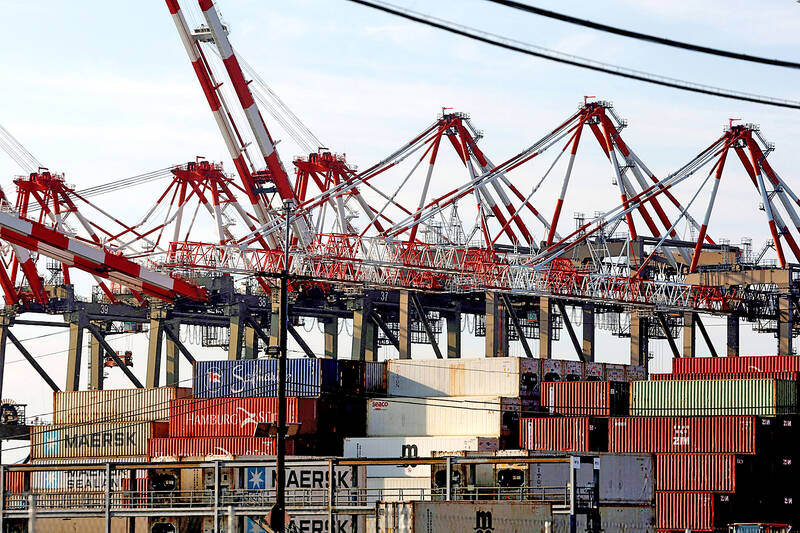A US dockworkers union reached a tentative deal on a new labor contract with a group of ocean carriers and terminal operators that, if ratified, would avoid a shutdown of East and Gulf coast ports next week.
“We are pleased to announce that ILA and USMX have reached a tentative agreement on a new six-year ILA-USMX Master Contract, subject to ratification, thus averting any work stoppage on Jan. 15, 2025,” the International Longshoremen’s Association (ILA) and US Maritime Alliance (USMX) said in a joint statement on Wednesday.
The two sides agreed to continue operating under their contract — which was extended after a three-day strike in October last year shut every major port on the eastern and southern coasts of the US — until the union representatives could vote and USMX members could ratify the terms of the final contract.

Photo: Reuters
The union and employer group had not bargained since November last year, when the ILA declared an impasse over semi-automated cargo handling cranes they said were a threat to union jobs. USMX maintained that new technology, like the cranes, is essential for port modernization and efficiency.
The new agreement would guarantee union jobs when certain technologies are implemented and includes — but is not limited to —the semi-automated cranes that had been a public focal point since November, according to a person familiar with the negotiations. The deal also preserves the 62 percent pay raise agreed to in October and continues to bar fully automated terminals.
“I applaud the dockworkers’ union for delivering a strong contract,” US President Joe Biden said in a statement on Wednesday night. “Their members kept our ports open during the pandemic, as we worked together to unsnarl global supply chains. Thank you to the carriers and port operators who play an essential role in our nation’s economy.”
A deal would mark the end of a contentious fight between the dockworker union and their employers over how certain technology could be implemented at the ports, which handle roughly half of all US container volumes. A strike would have resulted in between US$1 billion to US$5 billion in lost activity each day, according to various forecasts.

Leading Taiwanese bicycle brands Giant Manufacturing Co (巨大機械) and Merida Industry Co (美利達工業) on Sunday said that they have adopted measures to mitigate the impact of the tariff policies of US President Donald Trump’s administration. The US announced at the beginning of this month that it would impose a 20 percent tariff on imported goods made in Taiwan, effective on Thursday last week. The tariff would be added to other pre-existing most-favored-nation duties and industry-specific trade remedy levy, which would bring the overall tariff on Taiwan-made bicycles to between 25.5 percent and 31 percent. However, Giant did not seem too perturbed by the

Foxconn Technology Co (鴻準精密), a metal casing supplier owned by Hon Hai Precision Industry Co (鴻海精密), yesterday announced plans to invest US$1 billion in the US over the next decade as part of its business transformation strategy. The Apple Inc supplier said in a statement that its board approved the investment on Thursday, as part of a transformation strategy focused on precision mold development, smart manufacturing, robotics and advanced automation. The strategy would have a strong emphasis on artificial intelligence (AI), the company added. The company said it aims to build a flexible, intelligent production ecosystem to boost competitiveness and sustainability. Foxconn

TARIFF CONCERNS: Semiconductor suppliers are tempering expectations for the traditionally strong third quarter, citing US tariff uncertainty and a stronger NT dollar Several Taiwanese semiconductor suppliers are taking a cautious view of the third quarter — typically a peak season for the industry — citing uncertainty over US tariffs and the stronger New Taiwan dollar. Smartphone chip designer MediaTek Inc (聯發科技) said that customers accelerated orders in the first half of the year to avoid potential tariffs threatened by US President Donald Trump’s administration. As a result, it anticipates weaker-than-usual peak-season demand in the third quarter. The US tariff plan, announced on April 2, initially proposed a 32 percent duty on Taiwanese goods. Its implementation was postponed by 90 days to July 9, then

AI SERVER DEMAND: ‘Overall industry demand continues to outpace supply and we are expanding capacity to meet it,’ the company’s chief executive officer said Hon Hai Precision Industry Co (鴻海精密) yesterday reported that net profit last quarter rose 27 percent from the same quarter last year on the back of demand for cloud services and high-performance computing products. Net profit surged to NT$44.36 billion (US$1.48 billion) from NT$35.04 billion a year earlier. On a quarterly basis, net profit grew 5 percent from NT$42.1 billion. Earnings per share expanded to NT$3.19 from NT$2.53 a year earlier and NT$3.03 in the first quarter. However, a sharp appreciation of the New Taiwan dollar since early May has weighed on the company’s performance, Hon Hai chief financial officer David Huang (黃德才)